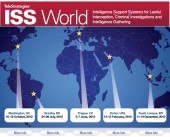Cybercensorship Wars
by Liam Sweeney / February 27, 2012 / 1 Comment
Fighter: Chris Smith
Chris Smith is a Republican representative for New Jersey who contributes to the resistance of the surveillance market. In 2006 he proposed the Global Online Freedom Act, which is “designed to help democratic activists and human rights defenders by creating a new transparency standard for U.S. Internet companies.” The bill also restricts the flow of U.S. technology to repressive regimes. Since 2006 the bill has undergone multiple revisions and is currently in committee.
In his remarks to the House, Smith fore-grounded the bill saying, “In the past five or six years the Internet has been transformed from a freedom plaza to dictator’s best friend. Every day we learn of more democratic activists being arrested through the use of a growing array of Internet censorship and surveillance tools that are abused by the governments of China, Belarus, Egypt, Syria and many other countries around the world. The stakes are life and death for online activists and they deserve our support and protection.”
- 2011 Fighters and Facilitators
- Facilitators
- • Blue Coat
- • Jerry Lucas
- • Gamma
- • Tatiana Lucas
- Fighters
- • Telecomix
- • Chris Smith
- • Julian Assange
- • Jacob Appelbaum
The Global Online Freedom Act will effect not only U.S. tech companies, but all tech companies listed on the U.S. stock exchange, a fact that has flustered the Russian government (expectedly, perhaps, as Russia holds national contests for the development of sophisticated surveillance technology). Smith addressed the fact that many of the businesses have defended their human rights transgressions with claims that, because they don’t sell directly to countries sanctioned by the U.S. government, they haven’t broken any laws. Smith’s bill intends to rectify that situation.
Facilitator: Jerry Lucas
Jerry Lucas is the president of TeleStrategies–a producer of telecommunications conference events in the United States–and host of the international surveillance trade show, ISS World. In 2002 Lucas launched the first ISS show, also called the “Wiretappers’ Ball,” to a crowd of three-dozen. The most recent event boasted 1,300 attendees, and while it has evolved into the central event for the growing industry, it has maintained secrecy by denying access to the public and media.
The Guardian quoted some of Lucas’ responses to questions concerning the ethics of the industry: “The surveillance that we display in our conferences, and discuss how to use, is available to any country in the world…Do some countries use this technology to suppress political statements? Yes, I would say that’s probably fair to say. But who are the vendors to say that the technology is not being used for good, as well as for what you would consider not so good? [It’s] just not my job to determine who’s a bad country and who’s a good country. That’s not our business, we’re not politicians… We’re a for-profit company. Our business is bringing governments together who want to buy this technology.”
Jerry Lucas suggests that a for-profit company is interested in earning its profit, rather than self-regulating. So what has the government’s role been? In a Fresh Air interview Bloomberg News reporter Ben Elgin, stated that “the U.S. government has been much more a customer on this subject than they have been a regulator.” He cites multiple U.S. agencies in attendance at the Wiretapper’s Ball, from “the FBI to the Fish and Wildlife Service.” As for the existing regulations, the Washington Post reports, “Some products need to be used in combination with other equipment in order to eavesdrop…Daniel Minutillo, a Silicon Valley-based lawyer who advises technology companies, said that in most cases his clients can show that their products have multiple uses, making them exempt from export licensing rules.”
Fighter: Jacob Appelbaum
Jacob Appelbaum is a prolific hacktivist and member of Wikileaks. He had the audacity to attempt a presentation at the 10th Wiretappers’ Ball this past October. He was intent on discussing Tor Project, an anonymity program he helped develop and Telecomix helped distribute to dissidents in the Arab Spring. Tor lets users evade the same surveillance technology developed by many of the firms attending the ball. He was ejected from the event after a member of one of the surveillance companies complained about his presence. Appelbaum said of the industry: “These people are not unlike mercenaries. The companies don’t care about anything, except what the law says. In this case, if the law’s ambiguous, they’ll do whatever the law doesn’t explicitly deny. It’s all about money for them, and they don’t care.”
“I was just in Tunisia a couple of days ago and I met people who told me that posting on Facebook resulted in death squads showing up in your house.”
He went on to address the common argument these firms make—that surveillance is good for us, “This tactical exploitation stuff, where they’re breaking into people’s computers, bugging them … they make these arguments that it’s good, that it saves lives,” he said. “But we have examples that show this is not true. I was just in Tunisia a couple of days ago and I met people who told me that posting on Facebook resulted in death squads showing up in your house.”
Appelbaum has run into some trouble with law enforcement over the last two years, at least in part for his involvement with Wikileaks. He is a volunteer for the controversial organization and provides Tor to individuals so that they can anonymously submit secret information. He has been detained in two U.S. airports where his computers and phones have been confiscated. Also, the U.S. government obtained a questionable court order, invoking the Electronic Communications Privacy Act from 1986, to gain access to Appelbaum’s Google and Twitter accounts. The court order has led many to call for an update to the legislation, which was conceived before the Internet was fully developed. An update of the bill has been referred to committee.
Continue reading this article on page 3








One Comment on "Cybercensorship Wars"
Thank you! The patriot act has done more to destroy freedom than any other legislation that I’m aware of. I’ve seen our US companies thrive from business with our own law enforcement people, we don’t even know what they provide at great profit to foreign governments. I have personal experience from the great state of Ohio. I now live in Pa and am glad to have found a public forum that openly discusses the erosian of our liberties. Thank You!